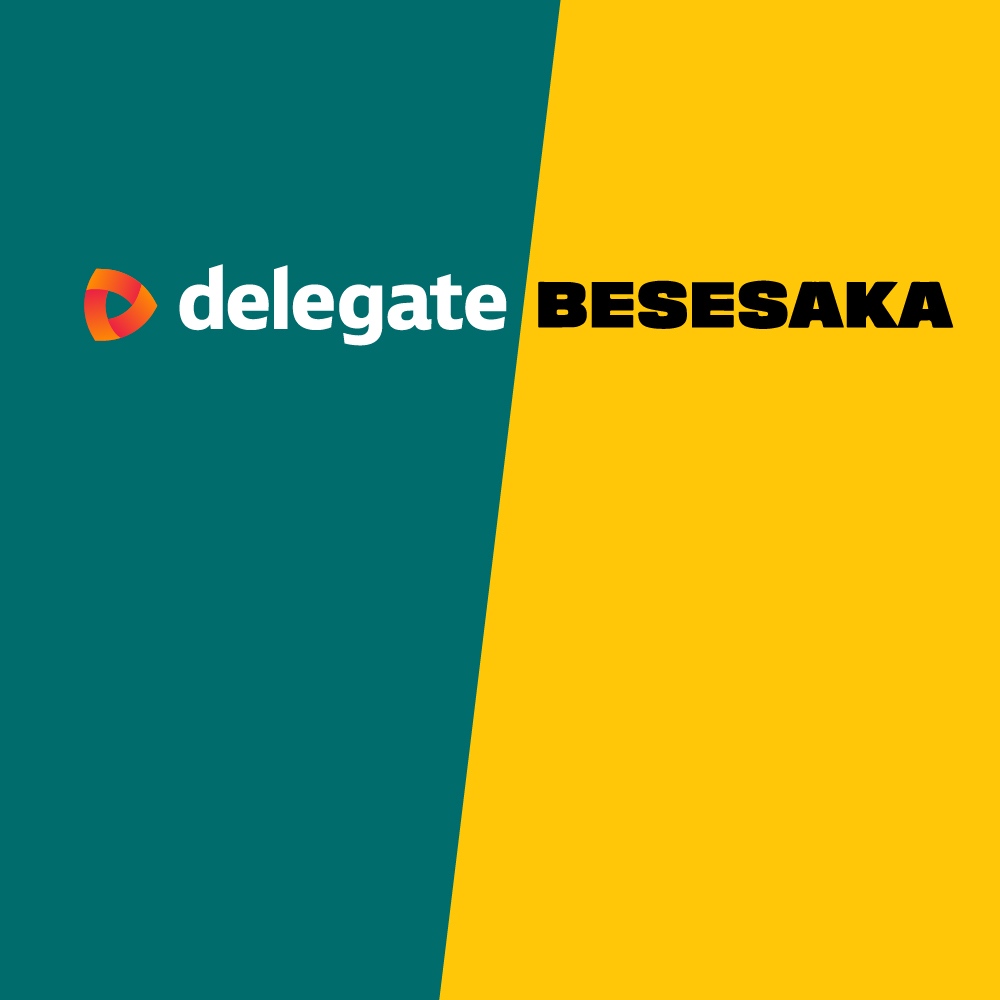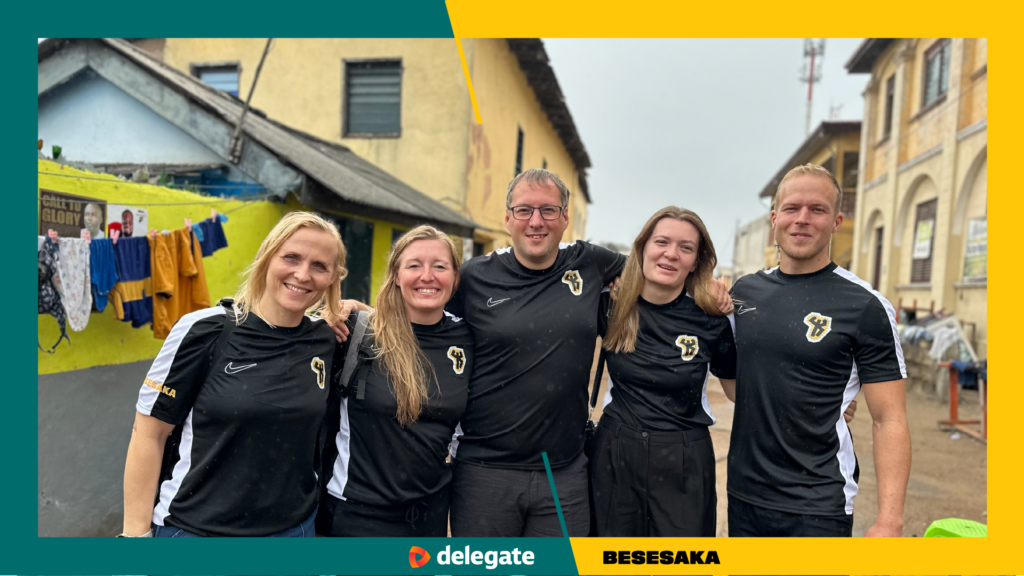Denne sensommer har fem delegatere endnu en gang været i Ghana for med egne øjne at se, hvordan samarbejdet mellem Delegate og organisationen Besesaka sikrer børn og unge en bedre fremtid gennem boksning og uddannelse.
“Det er en bydel, hvor der er mange ‘lost children,’ som de siger,” forklarer Charlotte Kampp Davidsen, People & Culture Specialist i Delegate. “Men det er også en bydel, hvor alle tager sig af hinanden.”
Besesaka is based in Bukom, one of the poorest parts of Ghana's capital, Accra. Here, only nine percent of children finish high school, and access to education is crucial to breaking out of poverty.
In 2020, Delegate entered into a five-year collaboration with Besesaka to ensure more children and young people can get scholarships and complete an education. This summer, five delegates revisited the project in Ghana.
“Formålet med vores besøg har bl.a. været at skabe netværk, opmærksomhed og forbindelser mellem os her i Danmark, de mennesker, der arbejder med børnene og børnene i særdeleshed,” fortæller Lilian Stenholt Thomsen, Principal Consultant i Delegate.
”Det var meget vigtigt for os, at vi ikke kom derned og følte, at vi skulle belære dem. Og omvendt kom vi ikke derned kun for, at de skulle lære os noget. Så det var en power exchange, en gensidighed, som også spiller rigtig godt i tråd med værdierne, som Delegate har”, fortæller Charlotte.
Charlotte Kampp Davidsen
People & Culture Specialist, Delegate

"It was essential to us that we didn't come down there feeling like we had to teach them. And conversely, we didn't come down there so that they could teach us something. So it was a power exchange, a reciprocity, which also plays very well with Delegate's values," says Charlotte.
As part of this mutual exchange, Delegate's expat colleagues held a coding workshop for 70 local children, 16 of whom are enrolled in Besesaka's official program.
"We are an IT company and wanted to weave it somehow in. But how do you do a workshop about IT with children who don't know about emails, software, or the use of computers in general?" Lilian asks.
The solution was micro:bits. A small computer attached to wheels to make small robot cars that can drive. And then, the children were given a simple introduction to the code.
"Code is three things: It's language, it's to-do lists, and it's creativity. This way, we could include the children by first asking what languages they know. Then they had to answer what they do in the morning before going to school - and in Bukom, it's normal for all children to, for example, sweep the floor at home before leaving," Lilian explains.
To illustrate that you have to follow the rules when writing code, the children were asked to draw a line on a large piece of paper on the floor for the robot to follow. The line had to be a certain thickness and have no sharp bends, and then they had to put the robot on the line and see if the robot could follow it.
"They make it work and are very excited. And that curiosity that children naturally have, there is no difference between a child in Denmark and a child in Africa. These children in Bukom don't have the same opportunities that we have here at home. So the fact that we managed to inspire them and give them a little piece of our IT world was a huge experience," says Lilian.

During the week-long trip, one experience made a big impression on Charlotte and Lilian.
"One of the evenings, we went out to dinner with the children from Besesaka, and that rarely happens to them," says Charlotte.
The 16 children from Besesaka had been told beforehand that they could choose between four dishes at the restaurant.
"So the children knew exactly what they wanted, but not everyone ate everything. And then we realized that visiting the restaurant was their opportunity to take some food home to their family. So, for example, one of the boys had brought a fanny pack and was ready to put chicken legs wrapped in napkins into it - he didn't know that he could take home a small box, a doggy bag, for the leftover food," says Charlotte.
Lilian also gained insight into the pecking order among the children when she couldn't finish her portion.
"At the restaurant, I was sitting next to one of the older boys, and when I was full, I put down my cutlery, and I could see that he was very attentive. He then quietly asks if I will return the leftovers to the hotel. I don't, so I ask if he wants it."
A younger child at the table is also interested in the leftovers, so Lilian tries to see if the two children could share, but the older child immediately puts the younger one in his place.
"When we returned to the hotel that night, I spent two or three hours trying to fall asleep. It was all running through my head. It's so different from what we're used to at home," Lilian says.
The encounter with the children and the hopelessness that prevails in Bukom also fuels the desire to save them all.
"You might want to give them some money. But that doesn't work because then it becomes a lopsided relationship. And that's not the point of Besesaka and our visit. The point is that there is this power exchange, reciprocity - we offer something and get something in return," says Charlotte.
Instead of giving them money, Charlotte found another way to show her gesture.
"I brought a lot of snacks from home, and I also brought them on our walks with the kids, including small, sweet coconut cheeses. So when we all started to get a little hungry, I could share my snacks. The kids say, "You're invited," meaning you can taste their food. And then I said the same thing: "You're invited." It felt equal in that way."
What do you take home with you from the trip?
"Humility and presence," Charlotte answers. "I am incredibly impressed by how James [The founder of Besesaka] and the others in the organization transfer many great values to these children and how they make a difference to the local community. You can't save everyone because if James had the opportunity, he would give scholarships to all the kids boxing in Bukom. But it's impressive that he has a vision to give some kids a better future."
"Love," Lilian replies. "And I've been very-inspired by the whole experience. I feel like I've given so much, and this coding workshop was one of my biggest things. Being able to help inspire children in that way is something I would like to explore further. I keep saying that I've put the experiences aside for now, but then I find them again and feel and get new things out of it. It's pretty amazing."
The experience of a lifetime
By subscribing to our newsletter, you will be notified when we host events, get inspiration from case, and much more.